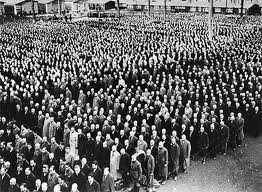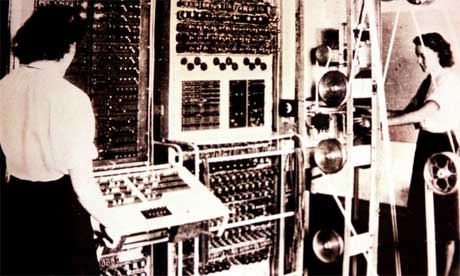| TNA Ref: HW
16/10: WW2 Decrypts - Bletchley Park: German Police Concentration Camp: GPCC Series Periodic Summary Report: ZIP / OS2 / 27.9.42 |
|
ZIP/OS
2/27.9.42 (Page: 1)
M O S T S E C R E T.TO BE KEPT UNDER LOCK AND KEY: NEVER TO BE REMOVED FROM THE OFFICE. THIS DOCUMENT IS TO RECEIVE CX/MSS SECURITY TREATMENT. IF FUTURE CIRCULATION IS NECESSARY, IT MUST BE PARAPHRASED, SO THAT NEITHER THE SOURCE OF THE INFORMATION NOR THE MEANS BY WHICH IT HAS BEEN OBTAINED IS APPARENT. § § § § GPDD No’s.:- 194/199, 201/203, 205, 218, 219, 222/3, 226, 233, 236, 239, 240/2, 247. ================================================================ Covering the period 3rd Aug. 1942 – 25th Sept. 1942 S U M M A R Y I. Personalities involved. II. The Waffen SS. III Concentration Camps. IV Labour and Industry. V Supplies. VI Transport. VII Norway. VIII Finland. IX Miscellaneous. GENERAL Evidence points to the formation of an SS Corps in the near future. The Leibstandarte Adolf Hitler and the Reich have been identified in France; the Totenkopf which has seen much hard fighting on the LOWAT will probably follow them. The Wiking is fighting in the Caucasus, and the new Cavalry Division has taken the field in Central Russia. Detailed information is given of M.T. in SS Divisions. A further examination is made of Concentration Camp figures; deaths from typhus have reached a very high figure in AUSCHWITZ. Finland has appeared in these messages for the first time. References are to GPDD Nos. unless otherwise stated. DISTRIBUTION LIST: 1. Major Leathem. 2. B.P.I.E. 3. Sigs. Officer Hut 3. 4. B.M. 5. Hut 6 6. Squadron Leader OESER. 7. Mr. F.L.Lucas. 8. File. 9. M.I.14(d).
ZIP/OS 2/27.9.42 (Page: 8)
III. CONCENTRATION CAMPS a) General For the first time returns are given for deaths of prisoners (223b/14,24,43,50): the figures for August are: NIEDERHAGEN 21, AUSCHWITZ 6829 (or 6889) men, 1525 women; BUCHENWALD 74; FLOSSENBÜRG 88. The AUSCHWITZ figure represents about 30% of the total given in the GPCC figures (see below); the cause is likely to be typhus, as typhus was rife in June (see last summary) and a policeman is suspected of typhus in September. (233b/40). Deaths must constitute a large proportion, if not all of the “departures” mentioned in the GPCC figures, which total 5325 for 19 days in August. During 19 days of August arrivals total 4989 so that they nearly balance deaths. About half of the prisoners are Jews. AUSCHWITZ is said to be under a ban on 4th September (223b/10). Deaths in BUCHENWALD represent a tiny proportion of the departures: for NIEDERHAGEN 34 departures are recorded for 19 days, and there are 21 deaths; for FLOSSENBÜRG 176 departures are recorded for 16 days and there are 88 deaths. A message of 4th Sept. implies that natural deaths will in future only be reported in writing. (226b/15). Executions are reported: a Russian civilian is shot when attempting to escape from NIEDERHAGEN (219B/17). FLOSSENBÜRG is allowed a lorry and a bus to convey Polish civilians to a wood for execution (223b/28). A prisoner is hung in HINZERT and nine more are shot. (223b/67, 226b/4). A Study of GPCC figures (to Aug.31st). The starting point for interpreting these figures must be the instructions given by ORANIENBURG. On 12 June (121/7), DACHAU is instructed by ORANIENBURG that Column 1 should be the total, including Russian Prisoners of War, Column 2, arrivals, Column 3, departures, . . . (column 6), total of Poles, Column 7, Russian prisoners of War. On 17 July (169/21), DACHAU is told that Russian civilian workers are to be added to the total of the daily prisoners strength returns (presumably the HOR HUG lists), and in the Camp report to be entered as civilian prisoners (cf. instructions to FLOSSENBUERG 131/25)- The missing columns in June instructions may be filled in from the STUTTHOF returns as column 4, Germans (or most probably political prisoners, as described in 131/25) and column 5, Jews.
ZIP/OS 2/27.9.42 (Page: 9)
1) The FLOSSENBÜRG figures (G.P.C.C. E) give a complete picture of the Camp from June 13th (erroneously quoted as July 13th in ZIP/O.S.1, p.18). On 29th August the total is 4777, consisting of 3207 Germans (all civilians) 11 Jews, 491 Poles, and 1068 Russian prisoners of war. This total includes 93 new arrivals and takes into account two departures. Mistakes are mostly easily seen, e.g. 1034 in column 2 of 20th August; 164 in column 7 for 1st July; 519 in column 3 for 6th July; 4652 in column 1 for 6th July. Sometimes the corruption is a little more difficult to detect: on July 2nd the total is 4454, but the figures in columns 4,5,6,7 add up to 4437. Arrivals are 34, and departures 4; the figures for July 1st suggest that the 4 departures are 1 from column 6, and 3 from column 7, and therefore that the 34 arrivals are to be found in columns 4 and 5 if these columns are emended to read 2613, and 47, the total is correct and the figures in columns 4 and 5 also agree with the figures for 3rd July, column 8. The last figure given for July is 4152 (erroneously given as 4652) for 6th July, on which day 420 political prisoners, 9 Jews, 88 Poles and 2 Russians (=519) had departed. The next figure is 10 August, when little change has taken place in the total, now 4159, (including Slowenes and Russian civilian workers, 131/25). Political prisoners have risen by 317 and rise steadily during the month to a peak of 3207 on 29th August; most of the arrivals belong to this category and the only large departures are 27 on 11th August and 53 on 31st August. Jews have fallen to 10, Poles rise gradually from the low figure of 427 to 491. Russian prisoners of war have fallen to 1091 and fall still further to 1068. 2) KL. DACHAU (GPCC:B). The numbers given are not complete and are not entirely clear. On August 1st., total is 9544, including 53 arrivals and 13 departures, but 3973 Political prisoners, 103 Jews, 3282 Poles, 0 Russian prisoners of war only total 7358. Therefore DACHAU is presumably following the instruction of 17th July (169/21) and entering non-German political prisoners in the total, but not in the first column of the daily returns. It seems clear, moreover, that Column 6 represents Poles in all these reports and not Jews as erroneously stated in ZIP/O.S.1, p.16. Column 7 gives Russian prisoners of war for which the camp has apparently not been used since July 17th; a similar clear out seems to have occurred on the 12th June. It is possible that, as no corres- ponding change occurs in the total, these prisoners have been reclassified as civilian workers (but cf. BUCHENWALD). Column 8 was clearly used for Russian civilian workers from 8th May (66/43); on 6th June the figure of 92 changes to 0. Only three prisoners have left since the preceding day; the 71 arrivals are distributed between Poles and Russian prisoners. The Russian civilian workers must therefore have been included in the total, but not in any of the columns, and column 8, which survives at least until 23rd June is probably kept as at STUTTHOF (152/11) for other nationalities. During August there is a net increase of 1323 prisoners, of which some 200 are political prisoners, some 40 Jews, and some 20 Poles. The bulk therefore are presumably Russian civilians. Although many figures are missing it is clear that large numbers of these have been passing through DACHAU in August, leaving however the increase of over 1,000.
ZIP/OS 2/27.9.42 (Page: 10)
513 prisoners departed on 8th August, and the figures show that the bulk of these were Russian civilians, of which a large number must have arrived in the missing days. On the 10th there is a net gain of 208, of which columns 4,5, and 6 only account for 123. On 27th to 29th, 99 plus 164 plus 53 arrive, and 20 plus 23 plus 10 depart; the bulk of the change again appears to be in Russian civilians. 3) MAUTHAUSEN (GPCC C) The August figures are arranged on the same pattern as the DACHAU figures except that again the Russian civilians do not appear in a separate column. On Aug.1. a total of 5916 includes 1447 political prisoners, 69 Jews, 846 Poles, 157 Russian prisoners of war and 10 (presumably “other nationalities” as above). On 9th July the Polish column receives an increase of 697 of the 751 arrivals, it was for these that MAUTHAUSEN asked ASUCHWITZ for waggons on 30 June (179/1); 400 of these apparently leave again on 14th July. The figures are arranged like this back to the change over on 15 June when they read: Total 5261, arrivals 27, departures 14, political prisoners 1491, Jews 29, Poles 561, Russian prisoners of war 278, others 10. But on June 10th a new column appears between the Poles and the Russian prisoners, 1929; if the July and August figures are true to type, this column is not, as stated in ZIP/O.S.1 page .17, the Polish column; it appears with the 1491 of 15 June to make up the balance of the total. It would seem most likely that, as it appears next the Russian prisoners of war figures, it represents Russian civilian figures but when in March the prisoner column starts decreasing rapidly without making any difference to the total (e.g. March 13th, 17th, 19th, 20th, 21st, 28th, 30th) there is no corresponding increase in this column; the increase is either in the unseen balance which later becomes the political prisoner’s column or, as at BUCHENWALD, Russian prisoners are not reckoned in the total at all. The August figures have gone badly astray for the 25th and 26th. It seems certain however that there has been a considerable decerease in Russian prisoners of War. 4. BUCHEWALD (GPCC D) The August figures follow the prescribed form of 7 columns. The aggregate of columns 4 to 7 falls over 3,000 short of the total. During the month the aggregate of columns 4 to 7 changes from 5752 on the 5th to 5716 on the 31st; the total increases from 9021 to 9886. It is reasonable to suppose a large increase of Soviet civilian workers. Before June 12, political prisoners are not included and there is a column between Poles and Russian prisoners of war for other nationalities. On 19th May two messages refer to the transfer of 1,000 Soviet prisoners (70/18,24): this change appears in the prisoners column for May 21st but is not reflected in the total. It must be assumed therefore that here at any rate Russian prisoners of war are not included in the total. 5. AUSCHWITZ (GPDD F) The August figures follows the prescribed form of 7 columns. Compared with camps hitherto examined, two points stand out 1. that the figures for arrivals and departures are very large every day (see above), 2. that the proportion of Jews is very high and increases from 6241 at the beginning of July to 12011 at the beginning of August. The aggregate of columns 4 to 7 are about 1888 below the total, which includes Russian civilian workers. The movements appear for the most part to be reflected in Columns 4 to 6. In view of the method of reckoning at BUCHENWALD it now appears likely that the large figures for Russians in the January and February returns are all prisoners of war, but that as at BUCHENWALD prisoners of war are not included in the total.
ZIP/OS 2/27.9.42 (Page: 11)
6. KL NIEDERHAGEN. The August figures follow the normal form. 7. KL LUBLIN. As at FLOSEENBÜRG from 9th July at least the figures give a complete picture of the camp. Before that as at AUSCHWITZ, prisoners of war were omitted. As at AUSCHWITZ, the proportion of Jewish prisoners is very high. 8. KL STUTTHOF These figures, which follow the standard form, do not appear in GPCC but in GPDD messages. The figures for men have remained at about 2,000; the figures for women have risen from 162 to 220 during August. Comment. Only FLOSSENBÜRG and LUBLIN give true returns. The omission by most camps of Russian civilians from Column 4, which is probably the letter of the German instruction) gives some room for falsification. The omission by some camps of prisoners of war from the total and from columns 2 and 3 leaves a large loophole for falsification. IV. LABOUR ORANIENBURG requests KL DACHAU for the transfer of 35 prisoners for the building of huts for the Bekleidungswerk of Waffen SS (223b/26) In answer to a request from BERLIN, the Kdt. Truppenübungsplatz DEBICA reports that owing to official difficulties he is unable to provide the 30 Polish civil workers; he will try to procure other workers (239a/1). FLOSSENBURG is using prisoner labour to build a new camp at KRONSDORF (219b/9; 223b/18), and are told to send 86 prisoners to work in quarries near GROSSROSEN (223b/39). AUSCHWITZ are asked either for 1,000 prisoners or to house 1,000 prisoners for clearing quarries of stone needed for building the DONAUBAHN (223b/10,51; 226b/1). Brigadeführer KAMMLER requires skilled labour (joiners, tinsmiths) for construction schemes in DNJEPROPETROWSK (205a/22). Brigadeführer GLOBOCNIK, SSuPf. LUBLIN, says that he is ready to undertake a settlement of Slowenes in his district after October 1st. (202a/31). V. SUPPLIES a) Petrol KGF Lager LUBLIN is to receive 6,000 Kg. Diesel (197a/50). SS Kav. Brig. Truppenübungsplatz PUSTKOW are to draw 10,000 liters “Otto” (201a/73). Their requirements appear to have been 14,200 liter “Otto” and an additional 5,000 liters “Otto” (201a/74,75) *2,000 Kg. Diesel from KRAKAU. (205a/46 cf 203a/28). SS O.A. DONAU has not received its August allocation on the 12th of the month. (203a/8). Kraftfahrtechnische Lehranstalt VIENNA is to draw 1,000 liters “Otto” (205a/44). KGF LUBLIN is allotted 5,000 Kg. Diesel (219a/19). Lubricating oil is urgently required in Norway. (223a/ 39). “Otto” and Diesel for the delivery of cars to the band (Musikzug) of the L SS AH was refused. (222d/4). A ban on Einzeltransport is also mentioned (223a/26) and is presumably due to shortage of fuel. * Four days later SS. Kav. Brig. DEBICA is to draw 5,000 liters “Otto”, ZIP/OS
2/27.9.42 (Page: 12)
PAGE 12 NOT TRANSCRIBED.
ZIP/OS 2/27.9.42 (Page: 13)
IX. MISCELLANEOUS a) Medical A suspected case of typhus is reported from AUSCHWITZ (223b/42). It is probable that on the 6th August Nachschubkdtr. Russland Mitte requests typhus vaccine for 50 men and spottenfever serum for 20 (197a/7); on the 8th; Dr. BLUMENREUTHER, FHA San.amt answers that the vaccine and serum are on the way by courier (199a/11). All front workers for South RUSSIA must be medically examined before leaving BERLIN (205a/22). The arrival of 31 Norwegian Nurses in BERLIN is mentioned on 1.9.42 (223a/34). One case of dysentery is reported from BOBRUISK. (239a/53). b) Crime and Discipline. Two messages deal with the posting of men, whose sentences are almost expired, to a Sondereinheit of the Waffen SS (201a/9-10.,11/12). The Rf SS refuses to grant a pardon for an SS Schütze who has been condemned to death. (202a/49-51). In a similar case an SS Richter asks for further details and decrees that the sentence is not to be carried out pending further investigation (202a/43-4). A Schütze cannot be posted to Truppenübungsplatz DEBICA as he, together with several other prisoners, is suspected of having carried out large scale robberies in the prison buildings of SS Gericht VI. (239a/14). Another Schütze is suspected of careless handling of arms and ammunition. (239a/26). c) Shortage of personnel. A message from BERLIN to SS Reiter Regt.3. DEBICA, states that it is impossible to provide NCO’s in view of th lack of training personnel (197a/18). Nachschubkdtr. Russland Süd requests FHA to postpone sending of munitions, as guards to ensure security of munitions are not available. (201a/13). SS Kav. Ers. Abt. Refuses to give up instructors for extension courses for the Hitler Jugend, as these are Required on other important work. At the same time the Abt, renews a request for volunteers (223a/21). d) Volksdeutsche in Waffen SS The oath taken by Hungarian Volksdeutsche recruits is as follows : I swear to you, Adolf Hitler, as Führer and Chancellor of the Reich, fidelity and valour. To you, and the leaders appointed by you, I promise obedience unto death, so help me God.” (201a/ADD 84). |
All Copyright material is published on this website under Fair Use provisions. All sources have been linked to or acknowledged. Information is published here in good faith and is intended for transformative, educational purposes only and not for commercial gain. Any non Copyright material published here may be freely copied and distributed, provided the source is acknowledged as www.whatreallyhappened.info


